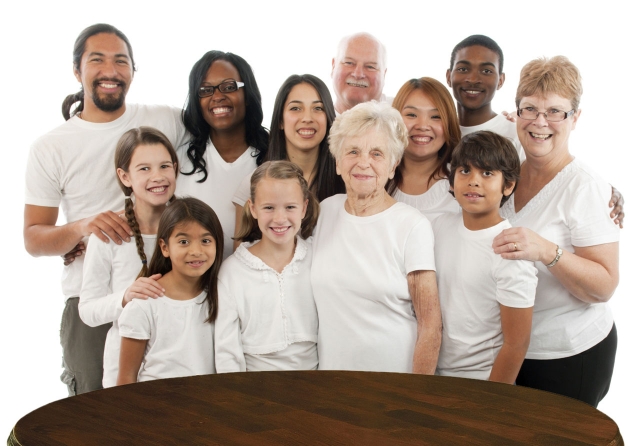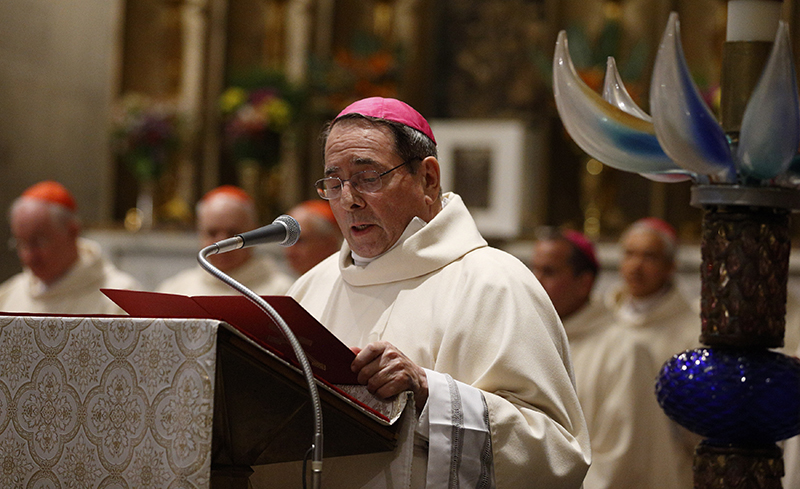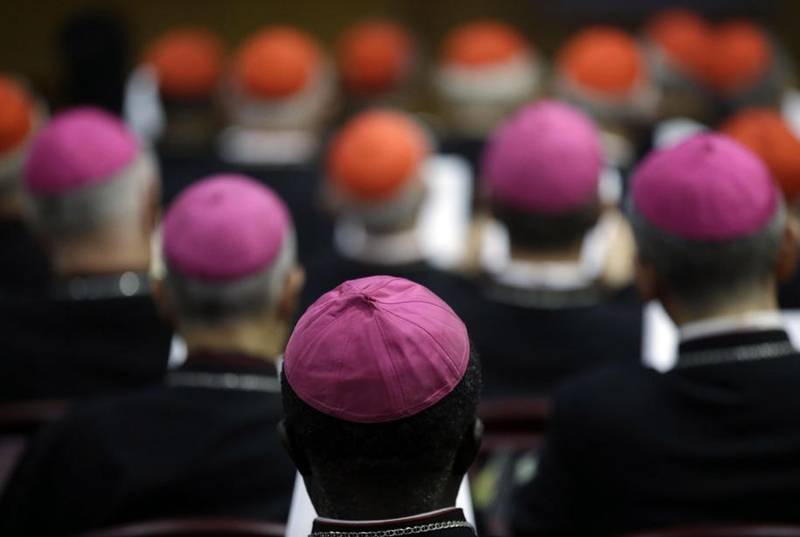
SYNOD ON THE FAMILY: A Reflection from the Paulist Fathers
The joy and the hope, the grief and anguish of the people of our time, especially of those who are poor or afflicted in any way, are the joy and hope, the grief and anguish of the followers of Christ.
– Gaudium et Spes, Preface, [1]
If Christ is to be for us a savior, we must find him here, now, and where we are, in this age of ours also;
otherwise he is no Christ, no Savior, no Immanuel, no “God with us.”
– Servant of God Issac T. Hecker, Founder of the Paulist Fathers
These two quotations, one from Vatican II’s Pastoral Constitution on the Church in the Modern World, the other from Servant of God Issac Hecker, reflect the missionary vision of the Paulist community today. As we approach the second session of the “Vatican Synod on the Family” in October 2015, amidst the chorus of voices being raised, we Paulists, wish to contribute our voice.
THE PAULIST MISSIONARY PERSPECTIVE
Founded in 1858, by five Catholic converts from various Protestant traditions, the Paulists have always sought a more inclusive community of God’s children. We have demonstrated time and again the value of hospitality, inclusion, and a special degree of understanding for those on their own unique journeys.1 Phrases like “meeting people where they are,” “walking the journey with someone,” and “being a wounded healer” resonate with our Paulist way of living the Gospel. We Paulists echo and applaud Pope Francis and the spirit of mercy, compassion, and outreach that he so readily incarnates and preaches. The old adage “you can catch more flies with honey than with vinegar” represents a truth about human nature. So regarding the upcoming part II of the “Synod on the Family” the Paulists stand foresquare and humbly with those who counsel “mercy.” As Pope Francis so poignantly phrases it:
The Church needs to be a field hospital and we need to set out to heal wounds, just as the good Samaritan did. Some people’s wounds result from neglect, others are wounded because they have been forsaken by the church itself; some people are suffering terribly. [2]
In this statement we Paulists will propose areas for consideration that arise from our pastoral experience. Nevertheless, we know that these areas come under the supreme issue of the family today—how its life and love form the human basis of faith. We pray that the Synod will find the language to re-articulate to the faithful today their essential role, through the human dynamics of family, in passing faith from one generation to another. We likewise pray that the Synod will envision ways in which modern families can come to see themselves more clearly as disciples who live the joy of the Gospel. The greatest challenge for church today is to encourage and equip families to accept, and live out, their fundamental role as the first and best teachers of faith.
SOME PAULIST SUGGESTIONS FOR THE SYNOD
1: A More Inclusive Notion of “Family”
First and foremost, we think the very definition of “family” ought to be as broad as possible, allowing for traditional as well as contemporary models and cultural differences. While “families” are and rightly ought to be the core building blocks in society, the fact is that real families (i.e., household communities) come in all sizes, shapes, and configurations. [3] The concept of ‘one-size-fits-all’ family ministry seems inadequate, outdated and insufficient. It seems to us that the Synod on the Family ought to listen to the peoples of the world – old and young, married and single, parents and children, those together as well as those estranged or divorced, straight as well as the lesbian, gay, bi-sexual, transgender, and questioning community (LGBTQ). What are their joys and hopes? What are their griefs and anguishes? How might we, as the followers of Christ, help them the most? How can we help the human family and individual human families move forward – humanely, personally, interpersonally and spiritually? [4]
2: Theological, Spiritual, & Pastoral Education at All Stages
In the United States and Canada, the Catholic Church and its many publishing outlets (including Paulist Press) have been at the forefront in offering educational and pastoral services. The vast majority of parishes and dioceses have created frequently-available series and programs to assist engaged couples of any age in preparing for their covenant marriages together. We applaud these valiant efforts and encourage similar frequent programmatic opportunities in all countries, dioceses, and parishes across the globe.
It is also commendable that so many parochial high schools and Catholic colleges and universities offer courses on dating, sexuality, marriage, parenting, and the like. In addition, campus ministry programs and Newman Centers offer similar opportunities for relational and marital education as well as one-to-one counseling and marriage preparation. Less prolific, but no less needed, are educational and counseling opportunities across the lifespan of one’s married or family life. Each stage of a married relationship or of a family’s evolution has its own particular learnings and pitfalls. We encourage national bishop conferences, dioceses, parishes, and catechetical publishers to foster an even richer menu of programs and aids for marriages and family life.
3: Ministry to Separated & Divorced Catholics
Just as our Holy Father Pope Francis tends toward a more gentle and decidedly pastoral approach, we Paulists consistently have welcomed and offered pastoral care to individuals in a variety of relationships, even those that may be more complex or conflicted than the ideal norm: interfaith marriages, pregnancy issues, ethnic or family ostracism or tensions, divorced, remarried, with or without annulments. Our first instinct is not to judge or condemn, but rather to view each individual and couple as our sisters and brothers. Much like Jesus in his encounter with the woman caught in the very act of adultery, our first pastoral utterance tends to be “neither do I condemn you.” [5]
How can we better walk with these people? If there is a solution–pastorally, psychologically, sacramentally, canonically–can we search for it together? Often the wisest and best counsel comes from those who have “been there.” We have been enriched by those women and men who have lived through and learned from painful marriages, separations, and civil divorce. We recommend to the Synod that fostering ministry to Catholics and others who are separated and divorced is pastorally necessary and can be healing ministry for all involved.
4: The Rightful Value and Use of Canon Law
When a recently separated or divorced person or newly single parent comes to the attention of a priest or parish minister, he or she is in pain, hurting, perhaps feeling guilty, often feeling overwhelmed. At this first stage, psychological counseling, spiritual support, and pastoral care are far more helpful than pulling down the Code of Canon Law from one’s bookshelf. The ministry of canon law supplements the primary mission of accepting people in their pain and promoting their healing.
Once Canon Law becomes more useful and pastorally appropriate for a given counselee, our application of Church law and the annulment process ought to be as expeditious and sensitive as possible. The tribunal practices and pastoral care approaches adopted by many U.S. dioceses across the post-Vatican II decades are to be commended and are recommended for wider use and application around the world, but even these practices can be cumbersome. Since “the law was made for humanity, not humanity for the law,” we applaud Pope Francis’ recent efforts to revise canonical procedures that will respond more readily to the situations of people who seek reconciliation in their lives and with the church and urge them to continue on this path. [6]
5: The So-Called “Internal Forum” or “Pastoral Solution”
In the post-Vatican II era there has emerged something called “the Internal Forum Solution.” [7] Initially it emerged and was proposed as a way to resolve questions of sacramental participation and access to communion for those in pastoral distress: knowing something was wrong with their prior marriage, they still were unable to attain a legal annulment and eagerly wanted to receive the sacraments. Provided no public scandal ensue, this “internal forum” or confessional-like practice (a discernment between the individual’s conscience and a local pastor or clergy person) seemed like a sufficient solution. Subsequently, some have suggested extending this extra-canonical solution for other hardship cases of divorced Catholics seeking access to communion, anointing of the sick, or other sacraments. Nevertheless, this pastoral practice has been discouraged in more recent years.
It is our recommendation that, in addition to fostering a greater pastoral use of canon law to assist separated and divorced persons who have remarried without a decree of nullity, the Church should foster the further use of this additional, extra-canonical approach known as “the internal forum” or “pastoral solution.” Erring on the side of graced mercy and pastoral care in doubtful cases would be a great gift to the faithful who yearn for the Eucharist, reflective of the attitude of Christ.
6: Access to Communion or Other Sacraments for the Divorced
When it comes to access to sacraments for such persons, we Paulists, consistent with our tradition, tend to side with those who emphasize that Jesus came as a healer, a physician for those who are ill and in need of care and nourishment. [8] We urge the Synod to consider St. John XXIII’s admonition that the “medicine of mercy,” the Eucharist, is to be freely dispensed. [9] Pope Francis points out that the Eucharist, although it is the fullness of sacramental life, is not a prize for the perfect but a powerful medicine and nourishment for the weak. Medicine and food are meant to heal and nourish. We trust the power of the sacrament to do its healing work. We recommend finding ways to welcome more people to the Eucharist, not to exclude them. [10] Once someone has been fed, they then have the sustenance to accept Christ’s way of life more fully in their lives.
7: The Orthodox View of “the Death of the Marriage”
A Possible Alternative
In some of the Orthodox churches and more recently in the writings of some Catholic moral theologians one finds that the concept of marriage “till death do us part” may not only refer to the physical death of one or the other spouse, but also might refer to the death of the marriage relationship itself. Might spousal- or child-abuse, untreated addictions, or similar extreme hardship situations indicate that the bond, the human interpersonal commitment, has snapped, been torn asunder and, in effect, died? [11] We urge the Synod to consider the pastoral remedies in our sister Orthodox Churches for those divorced and remarried.
8: Ministry to Married Couples and Those Divorced: A Summary Thought
Our underlying or overarching Gospel concern, derived from our 157 years of ministry with hurting and broken families, is that the Church can and should serve as a balm for their wounds, as the tender touch of mercy more than judgment. First and foremost, we find Jesus’ challenge to the crowd in the case of an adulterous woman to be cogent: “Let the one who is without sin cast the first stone.” [12] It is telling that Jesus himself, who is without sin, chose not to cast stones either. We all say before receiving the Eucharist, “Lord I am not worthy . . . . say but the word and my soul shall be healed.” [13]
9: LGBTQ Persons and Gay Commitments: A Pastoral Thought or Two
We Paulists find ourselves in the 21st century being called to open our hearts and our church doors to those of the LGBTQ communities. Lesbian women, gay men, bisexual and transgender persons, as well as those still questioning face many challenges: to figure out and accept their own sexual identities, to share their experience with family and loved ones, and to find their place in our society and in the Church. In a traditional theology or philosophy classroom, distinctions concerning human nature, sexual orientation and gender roles seem to be more or less easily mapped out. However, in modern medicine, recent genetics and gender studies, the halls of psychiatry and psychological counseling, in recent jurisprudence, as well as in the interpersonal lives and complexity of real LGBTQ people, these distinctions are less clear, less absolute, and undoubtedly in need of further study and theological discernment.
Despite public opinion surveys, which indicate a great acceptance of LGBTQ persons, data indicates that the number one cause of suicide among young men in North America is feeling hated and ostracized for “being gay” or even misperceived as gay. Facing one’s own sexual inclinations and homosexual or bisexual orientation can be so frightening, so shame-producing in one’s ethnic or cultural tradition that one would rather be dead. [14]
We as a Church must endevour to proclaim that every person has unique dignity in the eyes of God. This is one of the reasons so many have been touched by Pope Francis’ seemingly pastoral comment about gay persons, made during a plane interview returning from his first trip abroad, “Who are we to judge?” This past Lent, gay and transgendered inmates in a jail near Naples were invited to share lunch with Pope Francis. He seems to be echoing in his words and actions the quotation from Gaudium et Spes with which we began this reflection. Pope Francis is calling us to go to those on the periphery and proclaim to them that they are loved and valuable in God’s sight.
It has been our pastoral and personal experience, that members of the gay, lesbian, bisexual, and transgender community are people of good will, deep faith, with an abiding sense of their own Catholicity who have probed the depths of their consciences in their desire for the sacraments. [15] We urge those gathered for the Synod to consider the personal needs, sexual experience, and covenant commitment of our LGBTQ sisters and brothers with the utmost pastoral care and sensitivity.
SYNOD ON THE FAMILY: A PAULIST SUMMARY
It may be a bit presumptuous for us to propose that this reflection is somehow uniquely Paulist in its content or flavor. Indeed we consider it a reflection of the Gospel and Christ’s way of life for all people and all times. We realize that there are many other important issues that impact the family such as poverty, immigration, the role of women, and sex trafficking. Still, we feel called to speak on these issues from our pastoral experience. Surely the election of Pope Francis, his modeling of mercy and compassion, and the forthcoming Jubilee “Year of Mercy” all parallel the tenor and content of this reflection. While what we have written here may in some sense be distinctively Paulist, surely it is not uniquely so. Let’s reach out graciously, in gratitude, compassion, and hope. ‘All are welcome’ in this Church, this multi-faceted, grace-filled, and still mysterious Family of God: As we sing it, we strive to live it.
We conclude with the words of our founder Servant of God Isaac Hecker, which seem so poignantly and prophetically apropos:
If Christ is to be for us a savior, we must find him here, now and where we are, in this age of ours also; otherwise he is no Christ, no Savior, no Immanuel, no “God with us.”
Complete Article HERE!





